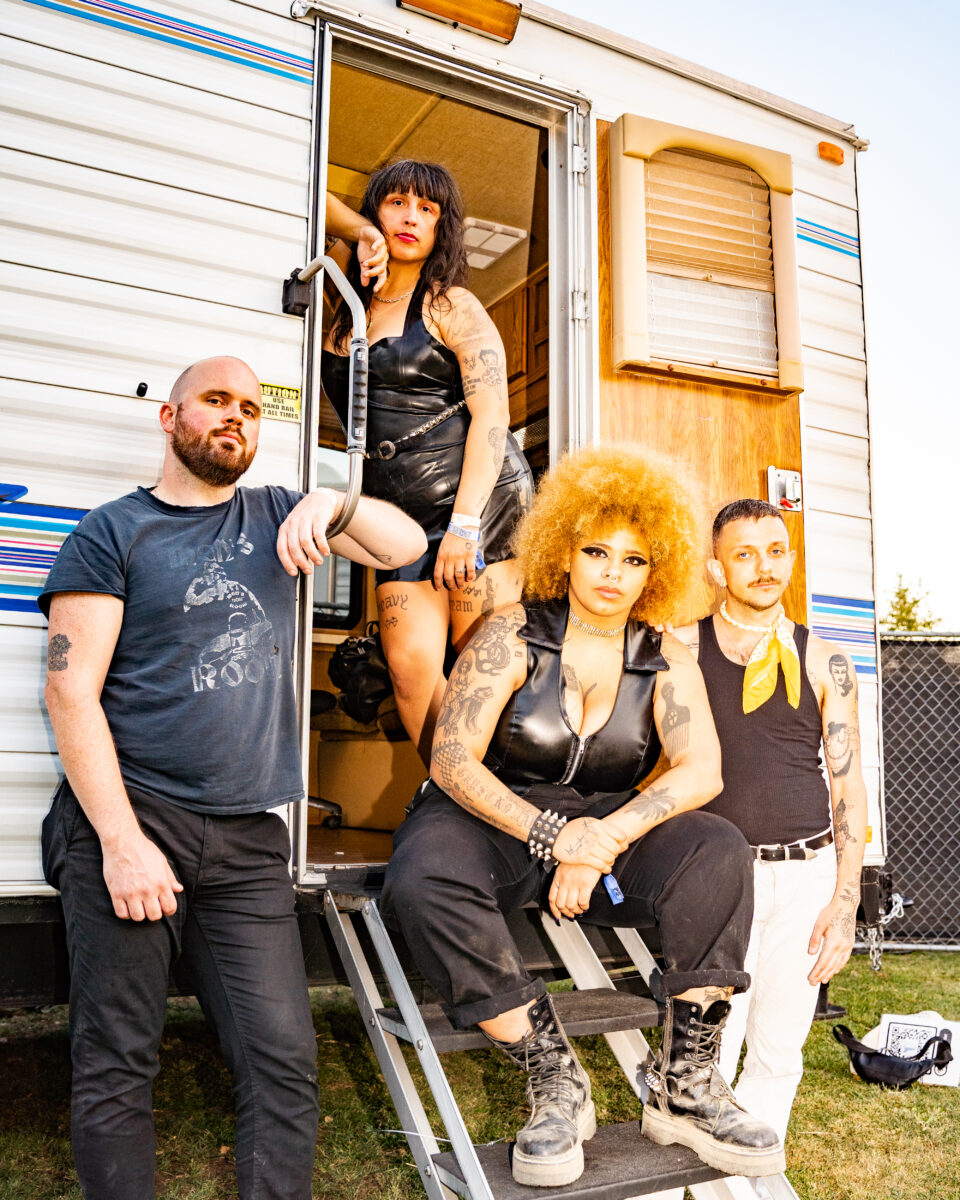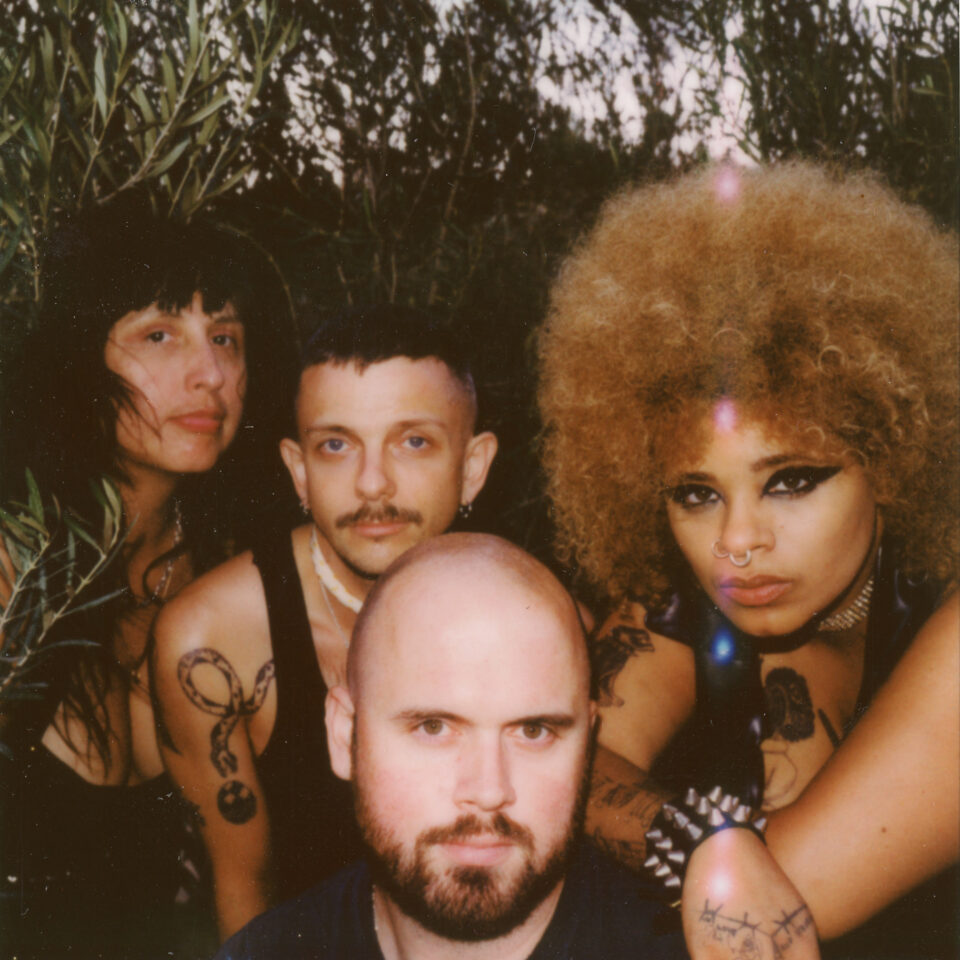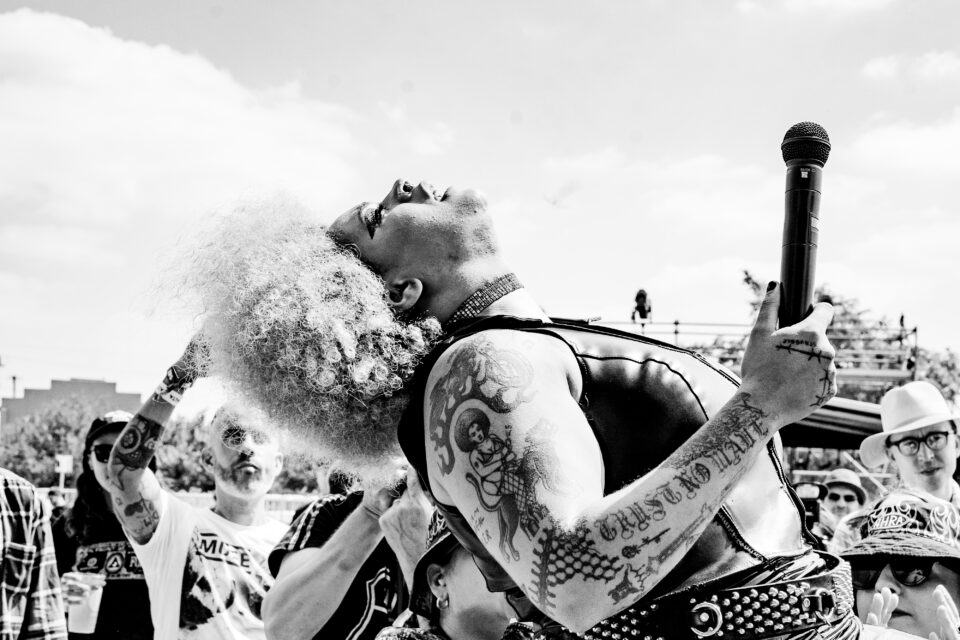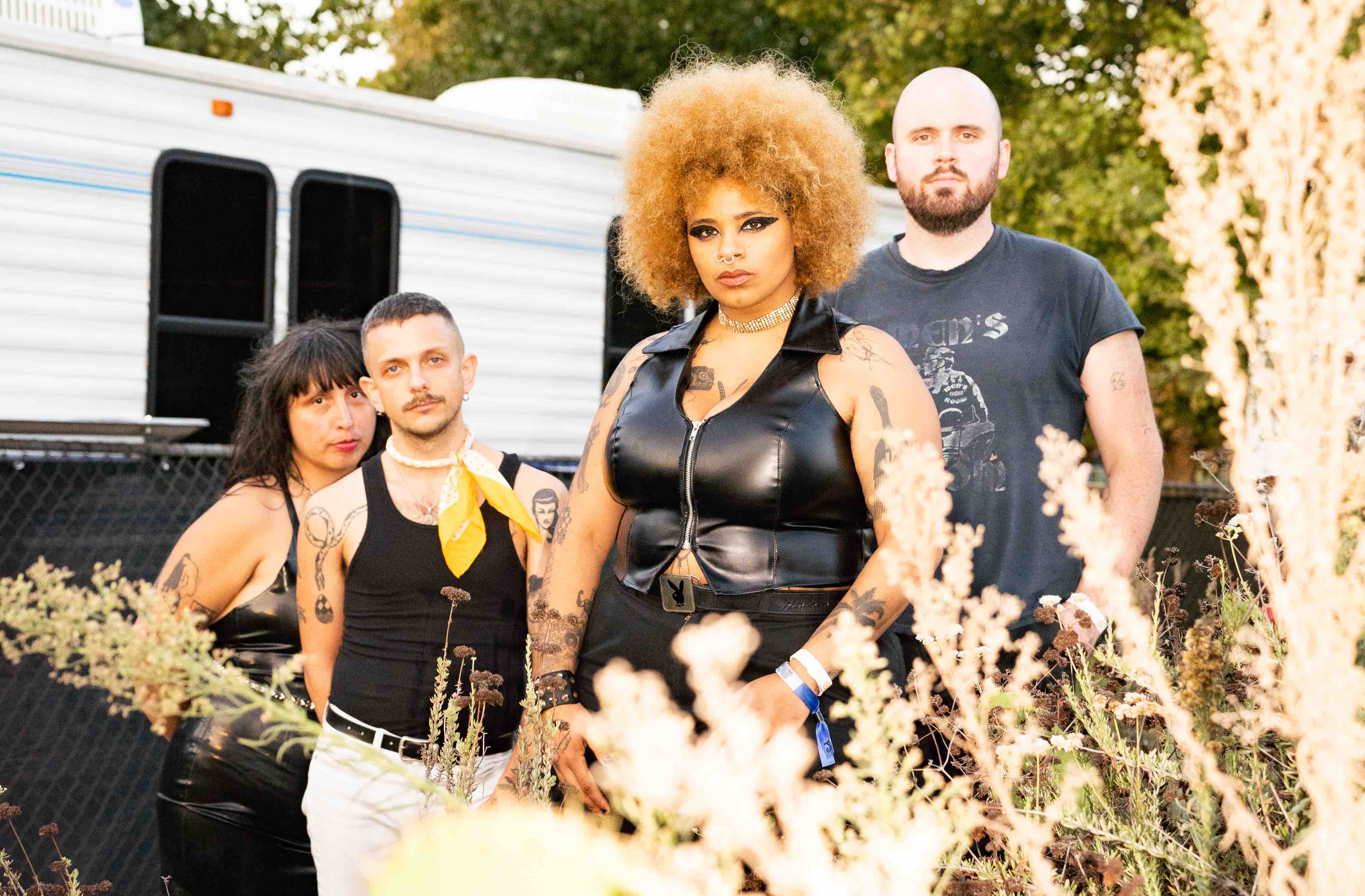For New Orleans quartet Special Interest, pleasure is political. Their music is a document of dystopian life on the brink of certain (at least as singer Alli Logout sees it) societal collapse, and Logout’s lyrics push an accelerationist manifesto aimed at speeding up the process. But the music itself overflows with vital energy that gives you good reason to be present in the moment, even as they dream of a post-civilization world. In other words: Earth may be burning, but that’s no reason not to have a good time.
For their third album, Endure, the group embraces a bigger sound that adds polish to their music’s serrated edges while losing none of their sharpness. Musically, the group has always been polymorphously perverse, smashing together a range of influences from Sparks to Nina Simone to iconic Berlin post-punks Malaria! in the kinkiest possible combinations. On Endure, they continue to channel the adrenaline of a hardcore show, the euphoria of a warehouse rave, and an arena-sized level of sonic ambition.
On the verge of Endure’s release, we met up with Special Interest at Buswick’s Maria Hernandez Park on a gorgeous early-fall day to talk about their new album, why Florida has the best goth clubs, and partying through the fall of Western civilization.
How did you all come together, and what brought you to this current stage of your existence?
Alli: Me and Maria were in a proto-Special Interest band called Pregnant in Texas. And then when I finally moved to New Orleans, we had the first Special Interest show, and that consisted of Maria with two guitars, a ’70s drum machine, and I played the guitar with a power drill. So it’s always been noisy. And then after that show, Maria curated the boys. She’s a really good matchmaker.
What was your common ground like, musically, creatively, personality-wise, politically?
Maria Elena: We all like to laugh. We all like a lot of music, different kinds. And we all are willing to exist in physical spaces that are uncomfortable.
“I actually find hedonistic behavior quite important. I’m constantly future-dreaming of ways for us to move past all this really great grief. It’s, like, mandatory for us to have fun.”
— Alli Logout
Is Special Interest a punk band?
Alli: Of course.
Nathan Cassiani: I’m an ex-punk now.
Maria: I got all his studded belts.
Alli: Yeah, I got his really good spray-painted shirt.
Musically you guys embrace fun and a kind of hedonistic quality that reminds me of The KLF—the way they sort of were really aggressive, but also just made really big fun rave music.
Alli: I love that connection. [But] I’m like, are we really even hedonistic? It’s just like, look around.
Nathan: We’re hedonists
Maria: We’re sensualists.
Alli: I just don’t think we’re gonna not have a good time. I think we can make a good time out of anything. I think our lives are kind of bleak in a lot of different aspects. You know, the life of the homosexual is one of great grief. A lot of love, but also a lot of suffering. A lot of degradation. Also a lot of love.

I see this thread in music now that goes back to the early SoundCloud rap boom of this nihilistic kind of hedonism—like, “I’m gonna get fucked up out of my mind and sing sad AutoTune raps.” I like that you guys push against that.
Maria: You can reflect reality and still have fun.
Alli: I think there’s so much complexity within the songs. If we’re talking about going out and getting really fucked up, then I’m always gonna be like, “But why are we here? What got us to this place?” I’m always kind of reflecting on how we’re actually feeling and what we’re doing to numb ourselves. I do actually find party spaces and hedonistic behavior quite important. I’m constantly future-dreaming of ways for us to move past all this really great grief. It’s, like, mandatory for us to have fun.
“We want to be able to hear the details and for things to hit really hard. Trying to work toward having a sound that was more physical, because you can actually really feel everything.”
— Ruth Mascelli
What was it like putting out your last album in the middle of that first scary wave of COVID?
Ruth Mascelli: I remember we had to decide whether we wanted to just put it out digitally or wait, because the records didn’t come ’til months later. It was right at the height of the uprisings in June of 2020. And it just felt kind of urgent, like, “We need to put this out there, it needs to be out in the world.”
Alli: I think that was our best decision. Some people have told me it was an album that really got them through that time, which is the most beautiful thing you could ever hear from a person about your work. I think it really was a soundtrack to that time, without the intention.
The new album feels a lot bigger.
Nathan: People have asked us about our direction and our intention—if we’re trying to be more polished or whatever—and it’s not really so conscious as that, but there’s so many albums like that that I appreciate throughout history.
Ruth: It still sounds so weird, though. But you can just hear everything. It sounds like nothing else.

I think being challenged creatively to try a different direction—even one that’s bigger and more polished—can be interesting, too, and a place to find inspiration.
Ruth: We didn’t want this new record to sound more polished, per se, just more impactful. We want to be able to hear the details and for things to hit really hard. Trying to work toward having a sound that was more physical, because you can actually really feel everything.
“People have asked us about our direction and our intention—if we’re trying to be more polished or whatever—and it’s not really so conscious as that.”
— Nathan Cassiani
You seem like you’d be fun to see live.
Alli: Shows right now are really funny and weird. We’ll have like a big, fun, chaotic show or [else] there will be 15 older men.
Nathan: When we played Pitchfork last year, it was kind of like, “We’re just kind of doing this for the money, to be honest,” [but] it was actually really fun. I remember the opposite stage had the Jumbotron footage of us playing and I was watching it while we were playing.
Maria: We weren’t in this band [because], like, “This is the band that’s gonna make it.” Ambition has never been a part of it. But apparently we’re more identifiable to other people outside of our communities. It’s really exciting to try and push boundaries and excite people to make stuff, because the whole point is that you shouldn’t have to learn how to play in a normal way, ever. If it sounds cool to you, keep going. And so being a part of something that’s trying to push people to create space where you can do stuff like that is good.
Alli: There’s no reason to be polished, really. Decolonize your guitar.

What’s it been like to bring your music to these different crowds?
Nathan: It really depends where we are, I guess. In bigger places like Los Angeles or New York, the crowd might be more mixed in terms of who’s there, but then you play a small city in the middle of Germany, and it’s definitely not the same experience.
Maria: I feel like the first time I noticed it was in Glasgow, when there was an older Scottish guy, and he was like, [Scottish accent] “Lyrics! Lyrics!” And he also was like, “‘Dark Entries’! ‘Dark Entries’!” about one of Nathan’s basslines. There are all of these OG 1977-type punks in Europe, and it’s interesting that they caught on to it. And then when we played with Boy Harsher, the trad goths kind of saw the fun and we got some swirl dancing.
“The whole point is that you shouldn’t have to learn how to play in a normal way, ever. If it sounds cool to you, keep going.”
— Maria Elena
I always loved finding goth clubs on tour in towns where you least expect to find them.
Alli: We found the goth club while we were on tour in Florida. It’s so sick—like the first floor is all sorts of hilarious BDSM stuff and Cure videos and new wave, and then the second layer is like sexy, old-timey romantic goth, and then the third floor is where you get the techno goths, the industrial music and people in cages with really bad dreadlocks. We had so much fun.
Nathan: There’s a naked guy there who wears masks and the rumor is that he’s a former mayor of Tampa.
Alli: It’s beautiful. They have tables right in the front that are reserved for the goth elders who came and held court while we were all dancing.
Maria: Southern alt-industrial culture is so fun.
Alli: I mean, just Southern culture in general. That’s also the funny thing about us getting out into the world. Southern culture and Southern punk and all Southern alt-ish cultures are so beautiful and so vast and dementedly overlooked. That’s what punk was—and still is—to me. It’s holding space for all sorts of freaks in one area. Just as long as you’re there to freak. FL









